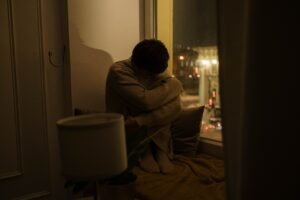AWARD-WINNING POST: SOUTH AFRICAN PARENTING BLOG AWARDS – WINNER BEST TEARJERKER 2020
My daughter didn’t know what had just happened. An empty cup hurtled over her head and her mommy screamed at her. She broke down in confused and frightened tears as I left the room. I flopped down on the couch in the study, my lower lip trembling, and murmured,
“I need a break…” to my husband.
This was the third time this had happened in recent weeks.
Like the rest of the world in this pandemic, my husband was working from home. Life was peachy and I was managing.
For the most part.
But in times like this, it all came back. And in times like this, I questioned my worth, my sanity and my ability to be a someone to anyone.
I threw the cup. I threw the cup out the kitchen door in anger. I threw it out of the door because she let go before I was holding it and her tea ended up on the kitchen floor. It was the fourth spill I had cleaned up in ten minutes.
A few weeks ago, I screamed at her and I don’t even remember why. But she burst into tears because I gave her such a fright.
A few weeks ago, I threw a pen across the kitchen and it shattered when it hit the floor.
A few weeks ago my husband had to leave an online meeting because I lost it at bath time.
And this particular morning, it was no big deal. My daughter had not disobeyed. She wasn’t whining or arguing. She dropped her cup accidentally. That’s all. But it sent me over the edge. And in that moment, terror seized me. Because, I thought it had gone. But it hadn’t.
Post-natal depression is real.
So is postnatal rage. (Yes, it’s a thing. I Googled it.)
I have diagnosed postnatal depression. And self-diagnosed postnatal rage.
It’s on days like this that I feel scared. It’s on days like this when seemingly insignificant things drive me to rage that I wonder if my anti-depressant dosage is high enough.
Ever since my husband has been home, I’ve been coping. And because of that, I’ve wondered whether it’s influenced by circumstances – he was home late from work; my daughter didn’t sleep and was grumpy; the baby was teething. But lately, I’ve lost it and he’s been here.
It’s not the first time I’ve put it down to circumstances. When my baby was born 14 months ago, I told myself it was the colic that was making me feel low. But it was more than low. I didn’t want to wake up. I didn’t want to go to bed. I feared what the night would bring. And I was scared of what daylight would hold. I wanted to pull the covers over my head, shut out the noise, shut out the world and sleep it all away. Some days I screamed. Some days I slammed doors. Some days I threw nappies across the room. Some days I put my baby down so I didn’t hurt her and clawed the bed, screaming into the sheets with force. Some days I wanted to leave and crash the car. This wasn’t like me. I didn’t throw things. I didn’t lose control. And then my daughter’s colic started to subside. But the emptiness, the guilt, the depression never left. It hung, like a shadow, over my head.
I saw a GP at the recommendation of another doctor friend. He put me on anti-depressants for postnatal depression.
They helped. I wasn’t so volatile. The emptiness, the bottomless pit I was in finally saw a shaft of light.
I tried to come off the medication once I completed the course. In short, it didn’t work. My husband said it was more important for the health of my family that I stayed on the pills. So I did.
My daughter was nearly one. But I felt my world slowly unravelling again. I remember standing in the parking lot buckling my baby into her car seat, swallowing tears and praying a prayer I never dared pray out loud,
“Lord, if I am not the best mother to my children that I should be, take me away from them. Give them someone who will be better than me.”
A few weeks later, all the feelings came back. I thought about ripping the curtains off the rails again. I thought about throwing plates on the floor in the kitchen.
And I thought about stabbing myself with a kitchen knife.
Months ago, I dragged my toddler inside and put her down in an angry rage on the kitchen floor. I forcefully closed the car door to muffle the sounds of my screaming baby. And I went to sit on the jungle gym and blocked my ears and squeezed my eyes shut like a two-year-old. I didn’t care that my children were probably scared and confused and crying their hearts out inside.
A few weeks ago, the same thing happened. I lost it. I removed myself. I closed the interleading doors. My children cried on one side of the door. I cried on the other side with my ears blocked. I didn’t care that they were crying.
Does any of this resonate with you?
If it does, you are not alone. I’m in the pit and the darkness with you. I know what it’s like to feel like you’re in a hole. Or like you’re drowning in a whirlpool.
I also know what it’s like to have good days. Happy days. Days when you question whether you’re making all this stuff up. And then it hits again. If you’re anything like me, the sunshine lightens my mood. But on bad days, even the warmth of the sun can’t ward off the cold darkness inside.
I wish I could give you an answer and tell you how to fix it. But I can’t.
According to the NHS website, symptoms can include some of the following…
- A persistent feeling of sadness and low mood
- Loss of interest in the world around you and no longer enjoying things that used to give you pleasure
- Lack of energy and feeling tired all the time
- Trouble sleeping at night and feeling sleepy during the day
- Feeling that you’re unable to look after your baby
- Problems concentrating and making decisions
- Loss of appetite or an increased appetite (comfort eating)
- Feeling agitated, irritable or very apathetic (you “can’t be bothered”)
- Feelings of guilt, hopelessness and self-blame
- Difficulty bonding with your baby with a feeling of indifference and no sense of enjoyment in their company
- Frightening thoughts – for example, about hurting your baby; these can be scary, but they’re very rarely acted upon
- Thinking about suicide and self-harm
I can’t remember what I scored but it was around 8.
If you were reading the above list and nodding to many of those symptoms (or crying while reading them because you relate to them so much!!), I suggest you do the following:
Go see a doctor
Don’t wait. Every day that you wait is a day that could have felt better. Every day is a day lost enjoying your family and loving them. Every day is a day where you could lose it again and say or do something you will regret. Don’t self-diagnose. Don’t play down your feelings. Get clarity and an objective professional to do the diagnosing for you.
Talk about it
Part of the healing process is to work through your emotions. It is so liberating to vent, to cry to offload. Find someone you trust to help you carry the burden and to be a listening ear.
Ask for help
This one is probably the hardest! No one wants to admit they have a problem. No one wants to tell anyone else that they were rough with their baby because they just couldn’t take it anymore. No one wants anyone else to know that they’re not coping – because everyone else is managing just fine. But trust me, I suffered through postnatal depression and hard-core emotions on my own for months because I was too proud and scared. I didn’t want people to think I was losing it. I didn’t want people to call me a ‘drama queen’. I was angry that few people really checked how I was doing. And I wanted to be angry. So I didn’t ask. I was scared of people not taking me seriously. I justified my secrecy, telling myself that people were too busy or also had children. In retrospect, I suffered for not humbling myself and asking for the help I needed so desperately and that would have willingly been given! I should have asked people to take my children when I couldn’t do it anymore. I should have told people that I really wasn’t coping. I should have reached out and not expected people to know just how bad it was even though I said nothing. I eventually realised that I had to tell people. And do you know what? They all asked me why I didn’t say anything and they all (including my friends who had babies younger than mine) said they would have gladly helped out if they knew how bad it was. Please find someone!
If you’re still not convinced or in denial, there is a set of 10 questions the doctor will ask you. They are online for you to do yourself. It’s called the Edinburgh Postnatal Depression Scale. Go and take the quiz yourself. This might affirm your suspicions or put you at rest that maybe you just need some TLC.
But know this, my fellow mommy, it’s a darn ugly place to be. It colours your world blue or black. There doesn’t seem to be a way out. And it feels like you are worthless, useless and empty. It’s as though you swallow more water each time you gasp for air as yet another wave smacks you in the face. The whirlpool sucks you down and dry. You have nothing left to give. And if you don’t get help, things will look grim. I know how you feel. I’m still there. But now that I’ve seen a doctor, I’m starting to talk about it and I’ve asked for help, the light is beginning to break through the clouds. I still have dark days. But I can smile again. I can laugh again. There is hope! Hang in there, mommy! I’m here for you!
Tags: advice, anger, ask, assistance, baby, child, children, cry, crying, depressed, depression, despair, diagnose, diagnosed, doctor, Edinburgh Postnatal Depression Scale, emotion, fear, help, overwhelmed, pit, postnatal, postnatal depression, postpartum, postpartum depression, prescribed, prescription, process, quiz, rage, sad, scream, screamed, self-harm, talk, temper, whirlpool





Oh my word, Kate! This blogpost is breathe taking and immensely brave! Raw, real, and honest. Thank you for sharing this. May it bring healing, hope, and encouragement to many! This article is so important in not hiding what many mums experience. Our Lord is with us all, even through depression! Lots of love to you! You are a warrior woman for our Lord! Xx
Thanks Margs! I think anyone who has depression can relate to that pit! Haha, certainly not a warrior woman!